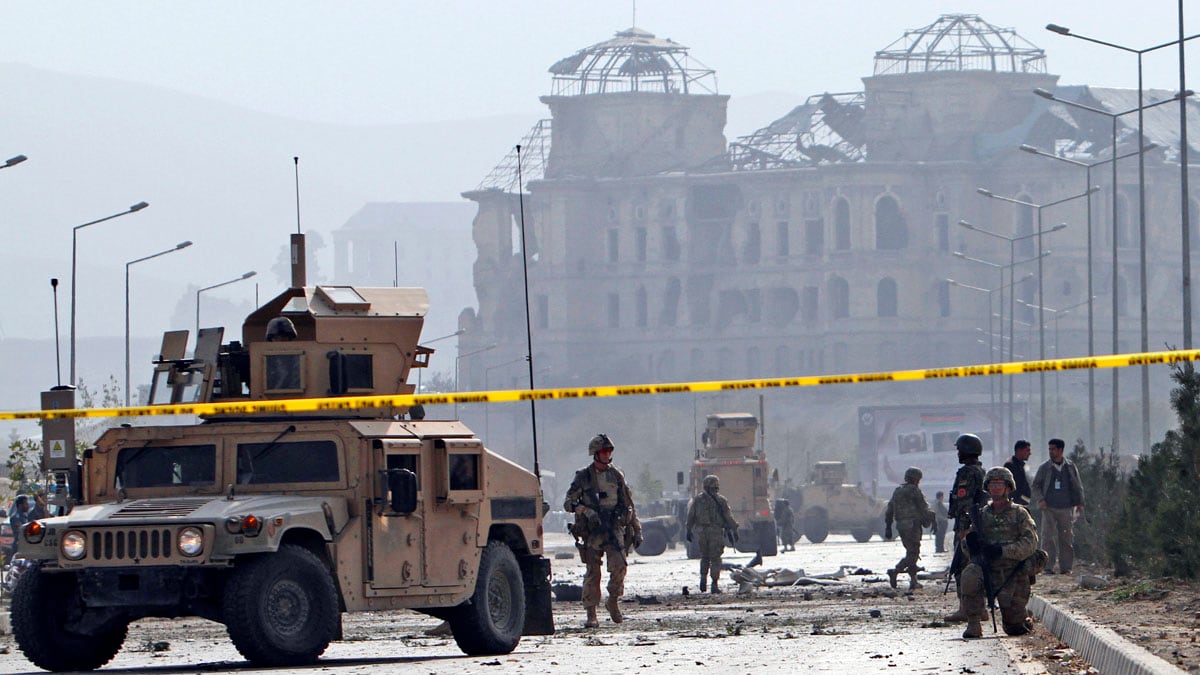Twelve Americans died this weekend in Afghanistan when a car packed with explosives struck a NATO armored bus. It would be nice if someone in the media took a break from investigating Herman Cain’s sex life to ask the people running for president what these Americans gave their lives for.
President Obama’s answer, presumably, would be that they gave their lives in the fight against al Qaeda. From at least the fall of 2009, the White House has emphasized that the Taliban alone, however threatening to the people of Afghanistan, does not threaten the United States. Our primary rationale for fighting them, therefore, is that their success would strengthen al Qaeda, which does truly threaten the American homeland.
That, at least, is the argument. It’s hard to know how deeply Obama ever believed it. In an astonishing passage in Bob Woodward’s Obama’s Wars, Douglas Lute, deputy national security adviser for Iraq and Afghanistan, speculates that Obama agreed to the military’s demands to send 30,000 more troops to Afghanistan “just to demonstrate, in effect, that it couldn’t be done.” As Lute implies—and Woodward details—many key figures in the Obama White House were dubious that fighting the Taliban was truly vital to fighting al Qaeda, and pessimistic that sending 30,000 more U.S. troops to Afghanistan would do any good.
They were, however, reluctant to overrule David Petraeus and a group of military leaders who were determined to apply in Afghanistan the counterinsurgency doctrine they believed had worked in Iraq, and who enjoyed far more credibility on Capitol Hill than did Obama himself.
Now the rationale for the Afghan War has collapsed almost entirely. Al Qaeda has never been weaker, not because of anything the U.S. is doing against it in Afghanistan, but because of the drone strikes and special-operations attacks we’ve launched in Pakistan and Yemen, and because the Arab Spring has made al Qaeda virtually ideologically irrelevant. So al Qaeda is becoming less and less of a threat, but the Taliban—which we only care about because of al Qaeda—remains strong enough to attack the U.S. Embassy in Kabul itself. And despite Obama’s pledges to begin troop withdrawals, the U.S. today has far more soldiers in Afghanistan than we did when Obama took office.

But as disturbing as Obama’s Afghanistan policy has been, at least he discusses the war. As The Washington Post pointed out in September, the “National Security” sections of Mitt Romney, Rick Perry, and Michele Bachmann’s websites don’t mention Afghanistan at all. (The same goes for Herman Cain’s.) It’s amazing.
On the one hand, as Woodward suggests, Obama’s decision to send 30,000 more U.S. troops to Afghanistan was influenced by his fear that if he cut bait, the Republicans would attack him as defeatist and weak. And the Republican candidates are indeed attacking him as defeatist and weak. They’re accusing him of apologizing for America, of thinking America is in decline, of “leading from behind,” of not believing in American exceptionalism and of transgressing various other chest-thumping platitudes about America’s role in the world.
But when it comes to mundane little practicalities like whether the United States should be at war in the Hindu Kush, the leading Republicans are either silent or wildly incoherent. At a Republican debate in June, Romney declared, “It’s time for us to bring our troops home as soon as we possibly can—as soon as our generals think it’s OK. One lesson we’ve learned in Afghanistan is that Americans cannot fight another nation’s war of independence.”
But whatever the United States is doing in Afghanistan, we aren’t fighting Afghanistan’s war of independence. Afghanistan has been independent since the 18th century, and if any foreign power is threatening that independence today, the most obvious candidate would be, well, us. Pressed further by reporters, Romney aides couldn’t say whether he’d withdraw troops more quickly than Obama or more slowly. Then, in October, in a much-hyped foreign-policy speech at the Citadel in South Carolina, Romney told cadets, “American foreign policy must be prosecuted with clarity and resolve. Our friends and allies must have no doubts about where we stand.”
So where does Romney stand on Afghanistan? “I will speak with our generals in the field, and receive the best recommendation of our military commanders. The force level necessary to secure our gains and complete our mission successfully is a decision I will make free from politics.” How’s that for clarity?
The bald truth is this. Given America’s massive financial problems—which are doing far more to undermine our world power than anything in Afghanistan ever could—spending billions more dollars and losing dozens more American lives so we can “degrade” a Taliban movement that may or may not have significant ties to a Qaeda network that is itself in free fall is sheer lunacy.
And politicians on both sides of the aisle know it. But there’s no advantage for them in pushing for a rapid, and potentially ugly and humiliating, withdrawal now, when they can defer the discussion until after the election. After all, no one is focused on Afghanistan anyway—no one, that is, except for the Americans who go to sleep every night worrying that their sons, daughters, fathers, mothers, brothers, sisters, husbands, or wives will die in a war that America’s leaders no longer believe in but lack the courage to end.






